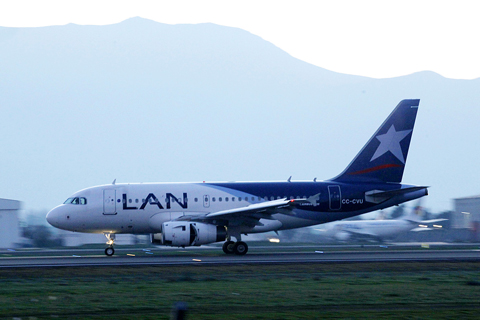Two of South America’s biggest airlines, Chile’s LAN and Brazil’s TAM, on Friday announced they planned to merge to create Latin America’s largest carrier.
The news sent shares in TAM soaring 30 percent on the Sao Paulo stock market. LAN shares leaped nearly 8 percent in Santiago.
The new parent group would be called LATAM Airlines, but the separate TAM and LAN logos would be maintained on aircraft in each country, the airlines said in a joint statement.

PHOTO: REUTERS
AWAITING APPROVAL
Regulatory authorities and shareholders would have to give their approval to the deal, which was outlined in a memorandum of understanding.
If the marriage goes ahead, the new airline would have combined revenues of more than US$8 billion, and fly passengers to 115 destinations in 23 countries.
It would have a combined workforce of 40,000 employees and a total fleet of 241 aircraft.
POTENTIAL SAVINGS
The companies said they believed the merger could save the new LATAM airline US$400 millions.
Sao Paulo-based TAM is Brazil’s biggest airline, controlling 43 percent of the domestic market in Latin America’s biggest economy.
LAN, which also has operations in Peru and Argentina, is one of the biggest airlines in Latin America, with a strong network of international routes which generate more revenue per passenger than domestic flights.
Trade review Air Transport World said, TAM carried 29 million passengers last year, most of them inside Brazil, whose population of 190 million is Latin America’s biggest. LAN Airlines carried 15 million passengers.
TAM’s revenue passenger kilometers, an industry measure, was 42.4 million to LAN’s 30 million.
However, LAN had an operating profit of US$435 million on US$3.7 billion of revenue last year, compared with TAM’s US$98 million on US$4.9 billion.
DISPUTE
Separately, Spain’s air traffic controllers’ union on Friday signed a deal with management to end a dispute over working conditions that had threatened to spark a strike at the height of the tourist season.
The agreement, signed by the Union of Air Traffic Controllers and the state-run airport management authority AENA, ends months of negotiations.
It is “satisfactory to both parties” and “guarantees the service of the controllers and industrial peace,” the head of AENA, Juan Lema, told a news conference.
The deal is expected to lead to the signing of a new collective agreement by the end of the year.
The negotiations between the two sides began in February after a government decree to slash what it said were the “millionaire salaries” and “incomprehensible privileges” enjoyed by the controllers at a time when the country is undergoing belt-tightening amid an economic crisis.
The government last month also introduced a decree on working conditions which would reduce rest periods and cut generous overtime benefits.
The controllers had threatened to go on strike this month, but backed down on Tuesday in the face of concerns voiced by the air transport and tourist sectors over the effect such a move would have on a key industry at the height of the tourist season.

Intel Corp chief executive officer Lip-Bu Tan (陳立武) is expected to meet with Taiwanese suppliers next month in conjunction with the opening of the Computex Taipei trade show, supply chain sources said on Monday. The visit, the first for Tan to Taiwan since assuming his new post last month, would be aimed at enhancing Intel’s ties with suppliers in Taiwan as he attempts to help turn around the struggling US chipmaker, the sources said. Tan is to hold a banquet to celebrate Intel’s 40-year presence in Taiwan before Computex opens on May 20 and invite dozens of Taiwanese suppliers to exchange views

Application-specific integrated circuit designer Faraday Technology Corp (智原) yesterday said that although revenue this quarter would decline 30 percent from last quarter, it retained its full-year forecast of revenue growth of 100 percent. The company attributed the quarterly drop to a slowdown in customers’ production of chips using Faraday’s advanced packaging technology. The company is still confident about its revenue growth this year, given its strong “design-win” — or the projects it won to help customers design their chips, Faraday president Steve Wang (王國雍) told an online earnings conference. “The design-win this year is better than we expected. We believe we will win

Quanta Computer Inc (廣達) chairman Barry Lam (林百里) is expected to share his views about the artificial intelligence (AI) industry’s prospects during his speech at the company’s 37th anniversary ceremony, as AI servers have become a new growth engine for the equipment manufacturing service provider. Lam’s speech is much anticipated, as Quanta has risen as one of the world’s major AI server suppliers. The company reported a 30 percent year-on-year growth in consolidated revenue to NT$1.41 trillion (US$43.35 billion) last year, thanks to fast-growing demand for servers, especially those with AI capabilities. The company told investors in November last year that

Power supply and electronic components maker Delta Electronics Inc (台達電) yesterday said it plans to ship its new 1 megawatt charging systems for electric trucks and buses in the first half of next year at the earliest. The new charging piles, which deliver up to 1 megawatt of charging power, are designed for heavy-duty electric vehicles, and support a maximum current of 1,500 amperes and output of 1,250 volts, Delta said in a news release. “If everything goes smoothly, we could begin shipping those new charging systems as early as in the first half of next year,” a company official said. The new